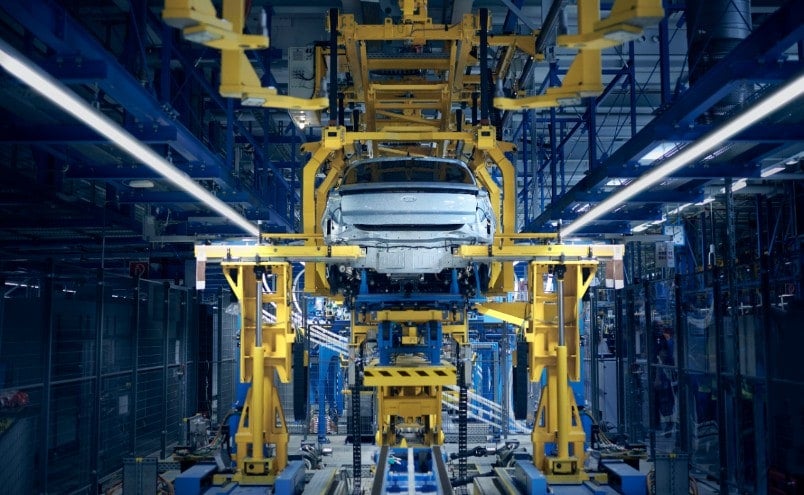Ford to axe 4,000 jobs in Europe – Just Auto

Ford has announced plans to create a more cost-competitive structure by further reducing its European workforce by 4,000, primarily in Germany and the UK, in ‘consultation with social partners’.
Ford said the measures are needed to ensure the long-term sustainability and growth of its business in Europe. Of particular concern, it said, is the health of Ford’s passenger vehicle business in Europe, where the company has incurred significant losses in recent years, and where the industry shift to electrified vehicles and new competition has been ‘highly disruptive’.
The company is planning to further reduce its European workforce by 4,000 positions by the end of 2027, pending consultations with its European social partners. The planned job cuts will primarily impact operations in Germany but also the UK, with ‘minimal reductions in other European markets’.
In addition, due to the weak economic situation and lower-than-expected demand for electric cars, Ford said it is further adjusting the production plan for the new Explorer and Capri. This will result in additional short-time working days at Ford’s Cologne plant in the first quarter of 2025.
“Ford has been in Europe for more than 100 years. We are proud of our new product portfolio for Europe and committed to building a thriving business in Europe for generations to come,” said Dave Johnston, Ford’s European vice president for Transformation and Partnerships. “It is critical to take difficult but decisive action to ensure Ford’s future competitiveness in Europe.”
Access the most comprehensive Company Profiles
on the market, powered by GlobalData. Save hours of research. Gain competitive edge.

Company Profile – free
sample
Your download email will arrive shortly
We are confident about the
unique
quality of our Company Profiles. However, we want you to make the most
beneficial
decision for your business, so we offer a free sample that you can download by
submitting the below form
By GlobalData
Ford said it recently issued an urgent call to action for industry, policymakers, trade unions, and social partners in Europe to work together for a successful industry transformation.
In a letter to the German government, John Lawler, vice chairman and chief financial officer of Ford Motor Company, reiterated Ford’s commitment to Europe and to the 2035 emission targets but stressed the need for a joint commitment by all stakeholders to improving market conditions and ensuring the industry’s future success.
“What we lack in Europe and Germany is an unmistakable, clear policy agenda to advance e-mobility, such as public investments in charging infrastructure, meaningful incentives to help consumers make the shift to electrified vehicles, improving cost competitiveness for manufacturers, and greater flexibility in meeting CO2 compliance targets,” Lawler said.
Ford also said it remains committed to Europe. The company has made significant investments over the last four years to transform its operations in Europe, retrain employees and build the next generation of electrified vehicles. This includes a $2billion investment to transform its Cologne plant in Germany into an electric vehicle centre.
Ford said the next generation of Ford vehicles in Europe will be software-defined, ‘offering our customers a superior digital and driving experience, with differentiated, iconic Ford design’.
Ford also said its vision for its future European business is defined by:
- A thriving Ford Pro commercial vehicle business, where Ford has been the brand leader for the past decade and one of the leading manufacturers. We will continue to invest in this business to expand our leadership and to support our business customers in their ambition to lower emissions, improve productivity and serve their communities.
- A successful and profitable passenger vehicle business, competing in select segments with iconic vehicles that are distinctively Ford. We will offer our customers a range of ICE, hybrid and fully electric vehicles, while meeting all European regulations.
- A modern, highly efficient industrial system, taking advantage of the latest innovation and technological advances in manufacturing, and reaching fully competitive levels of cost and quality. Ford is committed to the green transformation of our industry and doing our part to lower emissions.
Related
A top recruiter says sports marketing roles are hot right…
Jobs are opening up in the sports industry as teams expand and money flows into the industry.Excel Search &
Public employees and the private job market: Where will fired…
Fired federal workers are looking at what their futures hold. One question that's come up: Can they find similar salaries and benefits in the private sector?
Mortgage and refinance rates today, March 8, 2025: Rates fall…
After two days of increases, mortgage rates are back down again today. According to Zillow, the average 30-year fixed rate has decreased by four basis points t
U.S. economy adds jobs as federal layoffs and rising unemployment…
Julia Coronado: I think it's too early to say that the U.S. is heading to a recession. Certainly, we have seen the U.S. just continue t











